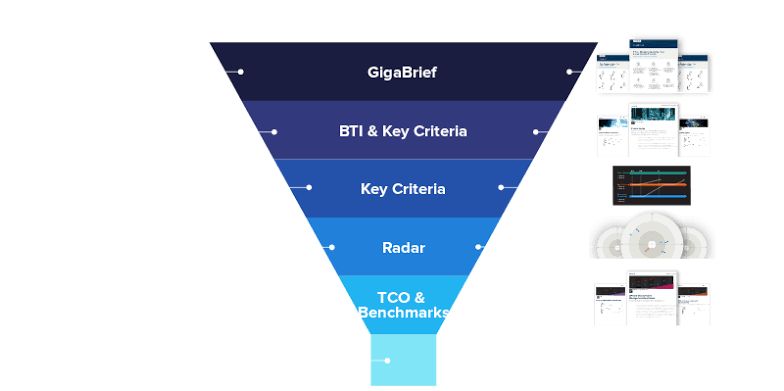
Gigaom – Emerging tech trends and industry analysis.
Gigaom offers timely, vendor-neutral insights into emerging technologies, empowering enterprises to make informed decisions in a rapidly evolving digital landscape. With a focus on practical, actionable advice, Gigaom's Radar reports, hands-on testing, and real-world case studies provide clarity on complex tech topics like edge computing, AI, cybersecurity, and cloud-native architectures, helping organizations stay competitive while navigating the challenges of digital transformation.
✨ Raghav Jain

Introduction
In a fast-evolving digital landscape, staying ahead of the curve requires constant vigilance, deep analysis, and a commitment to understanding where technology is heading. Gigaom, a prominent technology research and analysis company, plays a pivotal role in this context. Known for its insightful coverage of emerging technologies, market dynamics, and industry shifts, Gigaom is a trusted resource for business leaders, IT professionals, and tech enthusiasts seeking clarity amidst the noise.
Founded in 2006 by Om Malik, Gigaom initially started as a tech blog, gaining widespread recognition for its timely and accurate takes on Silicon Valley, startups, and digital innovation. Over the years, it evolved into a full-fledged research and advisory firm, offering in-depth reports, radar charts, and competitive analyses across multiple sectors including cloud computing, artificial intelligence, data infrastructure, cybersecurity, and enterprise technology.
This article provides a deep dive into Gigaom's approach to emerging tech trends and its impact on industry analysis.
Gigaom's Unique Value Proposition
Unlike traditional analyst firms such as Gartner or Forrester, Gigaom has carved out a niche by being faster, more accessible, and more actionable in its insights. Its "Gigaom Radar" reports are particularly renowned for visualizing complex technology ecosystems in a way that is both digestible and strategic. Here’s what sets Gigaom apart:
- Speed-to-Market: Gigaom publishes reports on emerging technologies far quicker than legacy firms.
- Vendor-Agnostic Research: Its analyses are rooted in performance metrics, not vendor hype.
- Focus on Practitioners: Content is designed for decision-makers in real-world enterprise environments, not just C-level executives.
- Community-Driven Insights: Leverages expert networks to refine perspectives from the field.
Key Emerging Technology Trends Identified by Gigaom
Gigaom’s research often highlights frontier technologies before they hit mainstream adoption. Here are some of the most impactful tech trends Gigaom has recently explored:
1. Edge Computing
As IoT and real-time analytics demand lower latency, edge computing is gaining ground. Gigaom emphasizes the decentralized model that processes data at or near the source rather than relying solely on cloud infrastructure.
- Key Insight: Gigaom notes that edge computing will be essential for applications like autonomous vehicles, smart factories, and telemedicine.
2. AI and Machine Learning Operations (MLOps)
The transition from experimental AI models to operational, scalable ML pipelines is underway. Gigaom’s reports on MLOps explore how companies can manage, monitor, and maintain AI systems over time.
- Key Insight: Success in AI hinges not just on building models, but on maintaining reproducibility, explainability, and scalability.
3. Cloud-Native Technologies
Kubernetes, containerization, and service meshes have transformed how applications are developed and deployed. Gigaom dissects how organizations can orchestrate microservices effectively across multi-cloud environments.
- Key Insight: Cloud-native infrastructure allows for unprecedented agility, but requires new skill sets and governance models.
4. Cybersecurity and Zero Trust
As remote work becomes normalized, the "trust but verify" model is no longer adequate. Gigaom is a major proponent of Zero Trust Architecture (ZTA) as the foundation of modern cybersecurity.
- Key Insight: Zero Trust is not a product, but a framework—Gigaom evaluates tools that support identity verification, micro-segmentation, and continuous monitoring.
5. Quantum Computing
Though still nascent, Gigaom has dedicated several deep-dive reports on the rise of quantum computing and its disruptive potential in cryptography, material science, and drug discovery.
- Key Insight: Quantum will not replace classical computing but augment it in solving particular classes of complex problems.
Gigaom Radar Reports: A Closer Look
One of Gigaom’s standout offerings is the Radar Report—a visual quadrant that positions vendors based on feature completeness and platform maturity.
Structure of Radar Reports
- Horizontal Axis: Feature play vs. Platform play
- Vertical Axis: Maturity vs. Innovation
- Bubbles: Each bubble represents a vendor, sized according to market presence or performance.
The radar helps companies evaluate vendor fit based on strategic needs rather than popularity or marketing clout. This makes the Gigaom Radar especially useful for enterprises that want actionable insights without being overwhelmed by marketing noise.
Example Radar Topics
- Cloud Database Platforms
- Network Security
- AI Infrastructure
- Observability Tools
- Data Lakes and Lakehouses
Gigaom's Methodology
What makes Gigaom's insights reliable? It employs a bottom-up research approach:
- Hands-on Testing: Gigaom’s analysts often engage directly with the platforms they evaluate.
- Expert Panels: Incorporates real-world feedback from engineers, architects, and tech leads.
- Objective Scoring: Uses quantitative metrics for consistency.
- Scenario-based Evaluation: Tech is rated based on use cases, not generic benchmarks.
This methodology ensures that the resulting analysis is not only data-backed but also practically useful for implementation.
Case Studies of Industry Application
A. Financial Sector Adopting AI Ops
A multinational bank used Gigaom’s insights to revamp its infrastructure monitoring with AI Ops platforms. Guided by a Radar report, the bank selected a vendor that fit its scale and security needs, reducing downtime by 35%.
B. Healthcare Moving to Edge
A large healthcare provider moved part of its data processing to edge devices based on Gigaom’s recommendation, improving patient data access speed and enhancing compliance with HIPAA.
C. Retail Embracing Cloud-Native
An e-commerce platform expanded its operations using Kubernetes after Gigaom’s analysis pinpointed the right orchestration tools for its growth phase, achieving 2x deployment speed and 40% cost reduction.
Gigaom vs Traditional Analyst Firms
Feature Gigaom Gartner Forrester Speed of Insights Fast Medium Slow Accessibility High (lower cost, concise) Low (premium access) Medium Practicality High Medium High Report Format Visual, scenario-based Text-heavy, quadrant-style Narrative-focused Focus Emerging tech, real-world use Enterprise maturity Strategic forecasting While all these firms provide value, Gigaom's lean and modern approach makes it particularly attractive to mid-sized enterprises, startups, and forward-looking CIOs.
Gigaom's Role in Shaping Industry Dialogue
Beyond reports, Gigaom also hosts webinars, podcasts, and briefings that stimulate thought leadership and strategic conversations. These interactions keep their research iterative and relevant.
- Podcasts: Focus on interviews with CTOs, VCs, and innovators.
- Events: Tech summits and briefings that allow for real-time dialogue.
- Community Engagement: Encourages expert contributions and case sharing.
Gigaom – Emerging Tech Trends and Industry Analysis
In the ever-evolving landscape of technology, where rapid innovation and disruptive ideas reshape industries with unprecedented speed, understanding and leveraging emerging tech trends is crucial for enterprises striving to remain competitive, agile, and forward-thinking. Among the many voices guiding this digital transformation, Gigaom has established itself as a trusted and insightful source of research and analysis, offering a refreshing alternative to traditional analyst firms like Gartner and Forrester. Founded in 2006 by renowned tech journalist Om Malik, Gigaom began as a blog and grew into a robust technology research and advisory platform that provides in-depth, vendor-agnostic insights into emerging technologies and digital strategies. Unlike legacy analyst firms, Gigaom emphasizes practical, scenario-based research designed to help IT decision-makers, architects, and engineers navigate complex technology choices in real-world environments. At the heart of Gigaom’s value proposition lies its celebrated Gigaom Radar reports, visual representations that map out the competitive landscape of technology vendors based on their innovation, platform maturity, and feature completeness. These radars are not only easy to interpret but also empower organizations to make informed decisions swiftly and confidently. Gigaom’s research encompasses a wide array of emerging technologies, including edge computing, which addresses the growing need for localized processing power in applications such as autonomous vehicles and smart manufacturing; artificial intelligence and machine learning operations (MLOps), which detail how AI models are deployed, monitored, and maintained in production; cloud-native development, with a focus on Kubernetes, containers, and service meshes that enable scalable and resilient applications; and cybersecurity, where Gigaom strongly advocates for the Zero Trust Architecture as the foundation of modern digital defense. It has also delved into quantum computing, highlighting its future role in solving complex scientific and cryptographic problems. These topics are not presented through high-level theoretical narratives, but through grounded, hands-on analysis and direct evaluation of technologies in action, often tested and benchmarked by the analysts themselves. This practical methodology, which includes hands-on testing, expert community input, and scenario-based scoring, ensures that Gigaom’s insights are not only accurate but deeply relevant to the unique needs of different industries, from finance and healthcare to retail and telecommunications. Gigaom’s reports often feature real-world case studies, such as a large healthcare provider improving patient data accessibility through edge deployments, a global bank reducing infrastructure downtime through AIOps, or e-commerce platforms achieving deployment velocity via cloud-native orchestration tools. Such use cases illustrate the direct impact Gigaom’s recommendations can have when implemented effectively. Moreover, Gigaom distinguishes itself through accessibility and speed—its reports are available at a lower cost and are produced much faster than those of traditional firms, allowing businesses to act on insights while they are still relevant. While Gartner’s Magic Quadrants and Forrester’s Waves offer comprehensive overviews of mature technologies, they often fall short when dealing with nascent tech spaces or fast-evolving categories. Gigaom fills this gap by focusing on emerging tech and providing guidance that is not just predictive but prescriptive, arming practitioners with tools and frameworks that can be applied immediately. The Gigaom Radar, in particular, plots vendors across axes of maturity and innovation, distinguishing between feature-focused and platform-focused solutions, making it especially useful for organizations evaluating technology not just for adoption, but for strategic alignment. Additionally, Gigaom contributes to the industry dialogue through webinars, summits, podcasts, and briefings, engaging with CTOs, CIOs, developers, and product managers to continually refine its perspectives. It fosters a collaborative ecosystem where research is shaped by both theoretical rigor and practical realities, ensuring that each report remains a living document, grounded in current market conditions and evolving technological capabilities. Gigaom’s relevance continues to grow as businesses face mounting pressure to modernize their infrastructures, secure digital assets, and unlock data-driven innovation. As hybrid and multi-cloud strategies become the norm, AI becomes integrated into daily operations, and cybersecurity threats grow increasingly complex, the need for clear, objective, and actionable analysis becomes paramount—and this is where Gigaom shines. Its client base includes not only tech startups and mid-sized enterprises but also Fortune 500 companies that rely on Gigaom to accelerate their digital initiatives and reduce the risk of costly vendor missteps. Furthermore, Gigaom’s reports are often used in boardroom discussions, procurement processes, and vendor negotiations, underlining their strategic significance. In a world that is increasingly shaped by automation, decentralization, and intelligent systems, Gigaom acts as both a guide and a filter, helping organizations focus on what truly matters amid the noise of marketing hype and fragmented information. By aligning its mission with the needs of modern tech practitioners and business leaders, Gigaom has become not just a research firm but a strategic partner in digital transformation journeys.
In the constantly evolving landscape of technology, where innovation is the driving force behind industry transformation, organizations must navigate a sea of emerging trends, new technologies, and competitive pressures to stay ahead of the curve. Gigaom, a technology research and analysis firm founded in 2006 by Om Malik, has become one of the most recognized voices in this domain, offering valuable insights and reports on a wide range of emerging technologies, market dynamics, and industry shifts that shape the digital world. What sets Gigaom apart from traditional research firms like Gartner, Forrester, and IDC is its unique approach to technology analysis, which emphasizes speed, accessibility, and practical, actionable insights that help enterprises and tech leaders make informed decisions quickly. While large research firms often take months or even years to publish comprehensive reports, Gigaom’s ability to deliver timely, vendor-neutral assessments of emerging technologies such as edge computing, AI, machine learning operations (MLOps), cloud-native architectures, and cybersecurity solutions has made it a go-to resource for businesses navigating the complexities of modern tech ecosystems. The company’s Gigaom Radar reports, for instance, offer a visual representation of the competitive landscape, helping organizations evaluate and select the right technology vendors based on their strategic goals. These reports are structured with two axes: one for feature completeness versus platform maturity, and another for innovation versus maturity. This allows decision-makers to identify vendors that best align with their needs, based not on superficial marketing claims but on in-depth analysis of actual product capabilities, scalability, and performance in real-world settings. This approach makes Gigaom’s research particularly appealing to IT decision-makers in industries like finance, healthcare, telecommunications, and retail, where the stakes of technology adoption are high, and the speed of change is relentless. Gigaom’s commitment to providing actionable insights is evident in the hands-on, practical nature of its reports, which are often bolstered by real-world case studies. For example, a large multinational bank may turn to Gigaom’s research on AI Ops to better understand how artificial intelligence can streamline IT operations, reduce downtime, and enhance customer experiences. Similarly, a healthcare provider might rely on Gigaom’s guidance to integrate edge computing solutions to manage patient data locally, ensuring low-latency access to critical health information in remote areas. By combining rigorous technical analysis with practical, scenario-based guidance, Gigaom provides enterprises with the tools they need to implement technologies effectively and gain a competitive edge. Another key differentiator of Gigaom’s methodology is its vendor-agnostic stance, which prioritizes objective evaluation over biased recommendations driven by vendor relationships or marketing partnerships. In contrast to firms that may have long-standing ties with specific technology vendors, Gigaom’s neutrality enables it to provide independent assessments that focus entirely on the merits of a product or service, without being swayed by external factors. This independence has earned Gigaom a reputation for being a reliable source of truth in the tech industry, especially as companies face increasing pressure to choose the right tools and technologies to support their digital transformation initiatives. Additionally, Gigaom’s reports emphasize real-world applicability and are tailored to the needs of business leaders, IT professionals, and developers who require insights that are not just theoretical but grounded in practical use cases. Whether it’s helping a company understand the long-term benefits of implementing a Zero Trust security model in response to rising cyber threats or evaluating the trade-offs between cloud-native technologies and traditional monolithic architectures, Gigaom’s analysis is designed to help organizations make informed decisions that drive long-term business value. This approach also extends to Gigaom’s research methodology, which includes hands-on testing, expert panels, and scenario-based evaluations to ensure that recommendations are based on real-world data and validated by practitioners who are actively working with the technologies in question. This emphasis on user feedback and practical performance has proven invaluable to businesses, enabling them to make informed decisions about which technologies to adopt, how to integrate them into their operations, and how to scale them for future growth. In the rapidly changing world of technology, where trends like cloud computing, machine learning, edge computing, and 5G networks are creating new opportunities while also raising new challenges, Gigaom’s ability to provide clear, concise, and timely insights has made it an indispensable resource for tech decision-makers. For example, as organizations increasingly look to adopt multi-cloud and hybrid cloud environments, Gigaom’s research on cloud-native technologies, such as Kubernetes, containerization, and serverless computing, helps companies understand how these tools can optimize their application deployment and management processes, while also reducing infrastructure costs. Similarly, Gigaom’s deep dives into the emerging field of quantum computing provide a roadmap for businesses to understand the long-term potential of quantum technologies and their implications for industries such as cryptography, drug discovery, and financial modeling. Gigaom has also made a name for itself by creating a rich ecosystem of educational content, including webinars, podcasts, and summits, that allow technology practitioners, developers, and business leaders to engage directly with experts and learn from real-world success stories. These events and resources foster a community-driven approach to learning and innovation, where practical insights from the field can be shared, debated, and refined. This sense of community and collaboration further distinguishes Gigaom from traditional research firms, as it provides a dynamic platform for organizations to stay connected with the latest trends, ask questions, and exchange ideas with peers who are facing similar challenges. Moreover, Gigaom’s continuous focus on emerging technologies—such as the Internet of Things (IoT), blockchain, 5G networks, cybersecurity, and AI—ensures that its reports remain highly relevant and timely, addressing the most pressing needs of businesses in the digital age. As industries such as healthcare, finance, and retail continue to adopt and integrate these technologies, Gigaom remains at the forefront, offering insights that help organizations harness the power of innovation to stay ahead of competitors, drive operational efficiency, and create new value for customers. This is especially important as businesses are forced to balance the benefits of innovation with the risks associated with adopting unproven technologies. Gigaom’s reports are designed to help businesses make these decisions with confidence, armed with the knowledge they need to understand the full potential and risks of emerging technologies before making significant investments. Ultimately, what sets Gigaom apart is its ability to combine technical rigor, real-world applicability, and speed to deliver insights that drive strategic decision-making in the fast-paced world of technology. Its vendor-neutral approach, hands-on testing, and practical recommendations enable businesses to stay agile, competitive, and well-informed in an increasingly complex and rapidly changing technological landscape.
Summary
Gigaom has redefined what it means to be a technology analyst firm in the digital era. By prioritizing speed, clarity, and practitioner-friendly research, it provides organizations with the tools they need to make fast, informed, and impactful tech decisions. From edge computing to AI ops, Gigaom’s insights help companies bridge the gap between emerging trends and business value.
Conclusions
- Gigaom stands out in the crowded field of tech analysis due to its agility, actionable insights, and scenario-based evaluation.
- Its Radar Reports are among the best tools available for real-world tech selection and strategy.
- Companies across industries—from healthcare to finance to retail—benefit from Gigaom’s grounded, vendor-neutral perspectives.
- In a world where technology changes faster than traditional firms can adapt, Gigaom provides a modern compass for navigating the digital future.
Q&A Section
Q1:– What is Gigaom best known for?
Ans:– Gigaom is best known for its Radar Reports, which provide visual, actionable analysis of emerging technology vendors and trends.
Q2:– How is Gigaom different from Gartner or Forrester?
Ans:– Gigaom is faster, more accessible, and focuses on practical, scenario-based insights, whereas Gartner and Forrester often emphasize high-level strategic analysis.
Q3:– What industries does Gigaom serve?
Ans:– Gigaom serves a wide range of industries including finance, healthcare, retail, manufacturing, and IT by offering deep analysis into emerging tech trends.
Q4:– How are Gigaom Radar Reports structured?
Ans:– Radar Reports use a quadrant model with axes for innovation vs. maturity and feature vs. platform play, placing vendors based on their strengths.
Q5:– What are some of the key trends Gigaom focuses on?
Ans:– Edge computing, AI/MLOps, cloud-native development, cybersecurity (especially Zero Trust), and quantum computing are among the major areas of focus.
Similar Articles
Find more relatable content in similar Articles

Protecting Kids in the Digital..
In an increasingly connected w.. Read More

Digital DNA: The Ethics of Gen..
Digital DNA—the digitization a.. Read More

Data Centers and the Planet: M..
As cloud computing becomes the.. Read More

Wearable Health Sensors: The D..
Wearable health sensors are re.. Read More
Explore Other Categories
Explore many different categories of articles ranging from Gadgets to Security
Smart Devices, Gear & Innovations
Discover in-depth reviews, hands-on experiences, and expert insights on the newest gadgets—from smartphones to smartwatches, headphones, wearables, and everything in between. Stay ahead with the latest in tech gear
Apps That Power Your World
Explore essential mobile and desktop applications across all platforms. From productivity boosters to creative tools, we cover updates, recommendations, and how-tos to make your digital life easier and more efficient.
Tomorrow's Technology, Today's Insights
Dive into the world of emerging technologies, AI breakthroughs, space tech, robotics, and innovations shaping the future. Stay informed on what's next in the evolution of science and technology.
Protecting You in a Digital Age
Learn how to secure your data, protect your privacy, and understand the latest in online threats. We break down complex cybersecurity topics into practical advice for everyday users and professionals alike.
© 2025 Copyrights by rTechnology. All Rights Reserved.